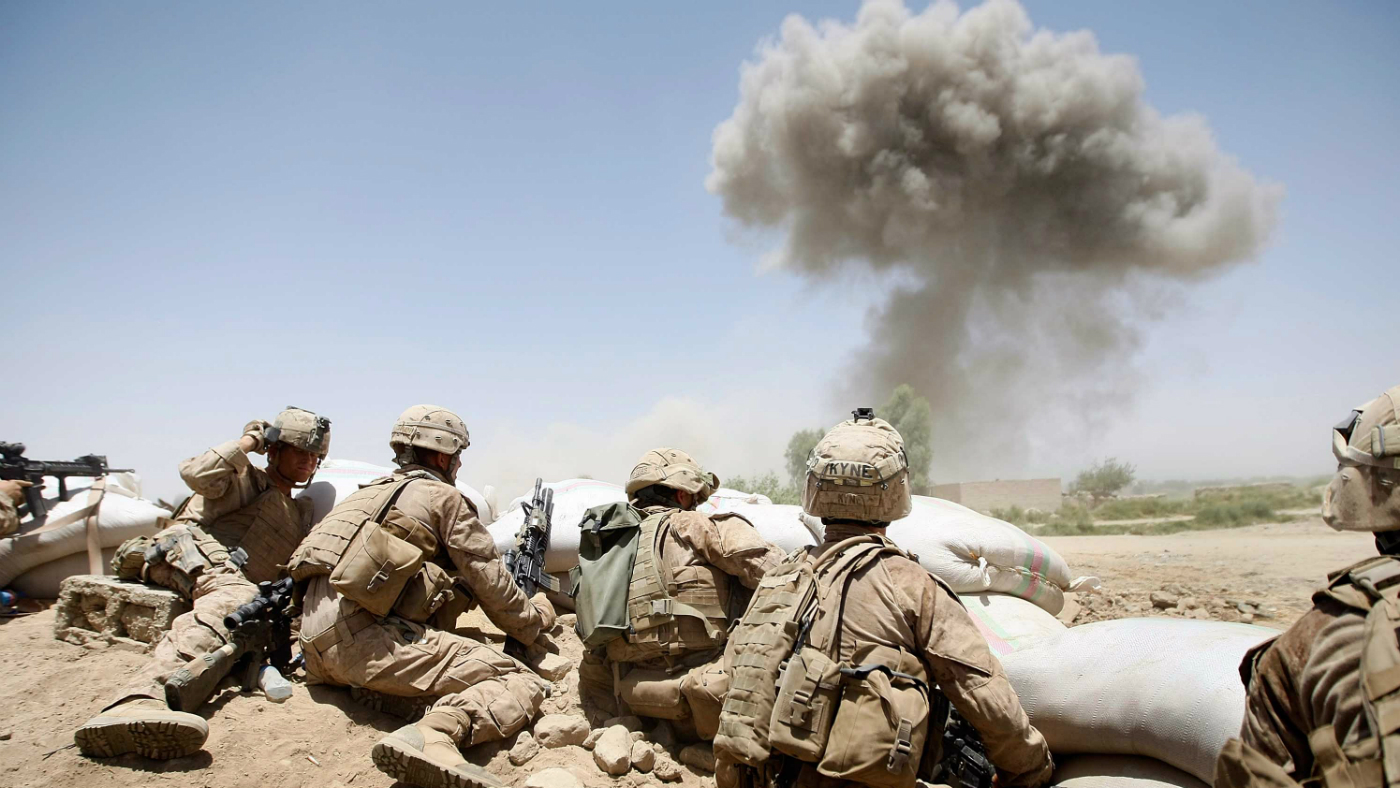Afghan war: what has been accomplished?
The US is withdrawing 4,000 troops amid troubled peace talks with Taliban

A free daily email with the biggest news stories of the day – and the best features from TheWeek.com
You are now subscribed
Your newsletter sign-up was successful
The Donald Trump administration is set to announce the withdrawal of around 4,000 troops from Afghanistan as part of a wider plan to remove all US forces from the country by November next year.
The US currently has between 12,000 and 13,000 troops stationed in Afghanistan, says NBC, and the withdrawal appears to be part of the ongoing, troubled peace talks between Washington and the Taliban.
But news of Trump’s intention also comes just a week after government documents were uncovered which show that US officials and three different presidential administrations “systematically misled the public about the war”, NBC also reports.
The Week
Escape your echo chamber. Get the facts behind the news, plus analysis from multiple perspectives.

Sign up for The Week's Free Newsletters
From our morning news briefing to a weekly Good News Newsletter, get the best of The Week delivered directly to your inbox.
From our morning news briefing to a weekly Good News Newsletter, get the best of The Week delivered directly to your inbox.
As the US winds down its role in Afghanistan, CNN says that Washington is currently in a state of reflection “about what, exactly, has been accomplished by an 18-year experiment in nation-building there”.
What has Trump promised?
Trump has repeatedly stated his intention to withdraw all US troops from Afghanistan by November 2020.
However, Business Insider says that there is not a clear timeline on when such a withdrawal might begin, nor specific details on how it would be conducted. Furthermore, the news site notes that the president “could face criticism and pushback for withdrawing troops without a solid peace deal in place with the Taliban”.
A free daily email with the biggest news stories of the day – and the best features from TheWeek.com
–––––––––––––––––––––––––––––––For a round-up of the most important stories from around the world - and a concise, refreshing and balanced take on the week’s news agenda - try The Week magazine. Start your trial subscription today–––––––––––––––––––––––––––––––
What has the US acheived?
Since the beginning of the Afghanistan war in 2001, approximately 2,300 US troops and more than 58,000 Afghan soldiers and police have been killed.
A further 38,000 civilians and 42,000 anti-government insurgents have also been killed, says CNN.
US attempts at nation-building in Afghanistan, which has cost an estimated $2trn (£1.5trn), “has yielded little that can be declared as a clear victory”, says CNN.
The New York Times notes that for years, military and civilian leaders “said that the mission to rebuild Afghanistan was not only possible, but succeeding”, but that documents revealed last week by The Washington Post show that “in private, the men and women who ran the war acknowledged to the Special Inspector General for Afghanistan Reconstruction what has long been clear to all but the most blinkered observers”.
“The dim prospects of achieving anything that could be called victory were evident almost immediately after the Taliban was toppled from power in 2002,” the paper adds.
A memo written by the then secretary of defence Donald Rumsfeld was quoted in the released papers, in which he stated that Washington was “never going to get the U.S. military out of Afghanistan unless we take care to see that there is something going on that will provide the stability that will be necessary for us to leave”, while Douglas Lute, a US Army general who served in the Obama and Bush administrations, reportedly stated in 2015: “We were devoid of a fundamental understanding of Afghanistan — we didn’t know what we were doing.”
Did the US do anything right?
Despite the papers making grim reading for three successive administrations, the US Agency for International Development (USAID) has a small number of successes it can hang its hat on as it prepares to withdraw from Afghanistan.
The agency notes that more than 3.5 million Afghan girls have been enrolled in schools in the country, while public and private universities have around 300,000 students, including around 100,000 women.
However, owing to the lack of stability in the country, the Afghan government reports that 3.5 million children are still out of school – 85% of whom are girls, according to Human Rights Watch. The organisation adds that just 37% of adolescent girls are literate, compared to 66% of adolescent boys.
USAID also points to the more than 1,200 miles of new highway that has been built, including the ring road that connects many of the country’s rural provinces, CNN says.
But overall, the “central government in Kabul remains in a precarious position”, the broadcaster adds, noting that although the war in Afghanistan began as a regime-change operation it has “morphed” into a “more open-ended mission” with no real solution.
-
 How the FCC’s ‘equal time’ rule works
How the FCC’s ‘equal time’ rule worksIn the Spotlight The law is at the heart of the Colbert-CBS conflict
-
 What is the endgame in the DHS shutdown?
What is the endgame in the DHS shutdown?Today’s Big Question Democrats want to rein in ICE’s immigration crackdown
-
 ‘Poor time management isn’t just an inconvenience’
‘Poor time management isn’t just an inconvenience’Instant Opinion Opinion, comment and editorials of the day
-
 Munich Security Conference: a showdown between Europe and Trump?
Munich Security Conference: a showdown between Europe and Trump?Today’s Big Question Report suggests European leaders believe they can no longer rely on the US for military support – but decoupling is easier said than done
-
 New START: the final US-Russia nuclear treaty about to expire
New START: the final US-Russia nuclear treaty about to expireThe Explainer The last agreement between Washington and Moscow expires within weeks
-
 Would Europe defend Greenland from US aggression?
Would Europe defend Greenland from US aggression?Today’s Big Question ‘Mildness’ of EU pushback against Trump provocation ‘illustrates the bind Europe finds itself in’
-
 Greenland, Colombia, Cuba: where is Donald Trump eyeing up next?
Greenland, Colombia, Cuba: where is Donald Trump eyeing up next?Today's Big Question Ousting Venezuela’s leader could embolden the US administration to exert its dominance elsewhere
-
 Did Trump just end the US-Europe alliance?
Did Trump just end the US-Europe alliance?Today's Big Question New US national security policy drops ‘grenade’ on Europe and should serve as ‘the mother of all wake-up calls’
-
 Trump peace deal: an offer Zelenskyy can’t refuse?
Trump peace deal: an offer Zelenskyy can’t refuse?Today’s Big Question ‘Unpalatable’ US plan may strengthen embattled Ukrainian president at home
-
 Vladimir Putin’s ‘nuclear tsunami’ missile
Vladimir Putin’s ‘nuclear tsunami’ missileThe Explainer Russian president has boasted that there is no way to intercept the new weapon
-
 Russia’s war games and the threat to Nato
Russia’s war games and the threat to NatoIn depth Incursion into Poland and Zapad 2025 exercises seen as a test for Europe